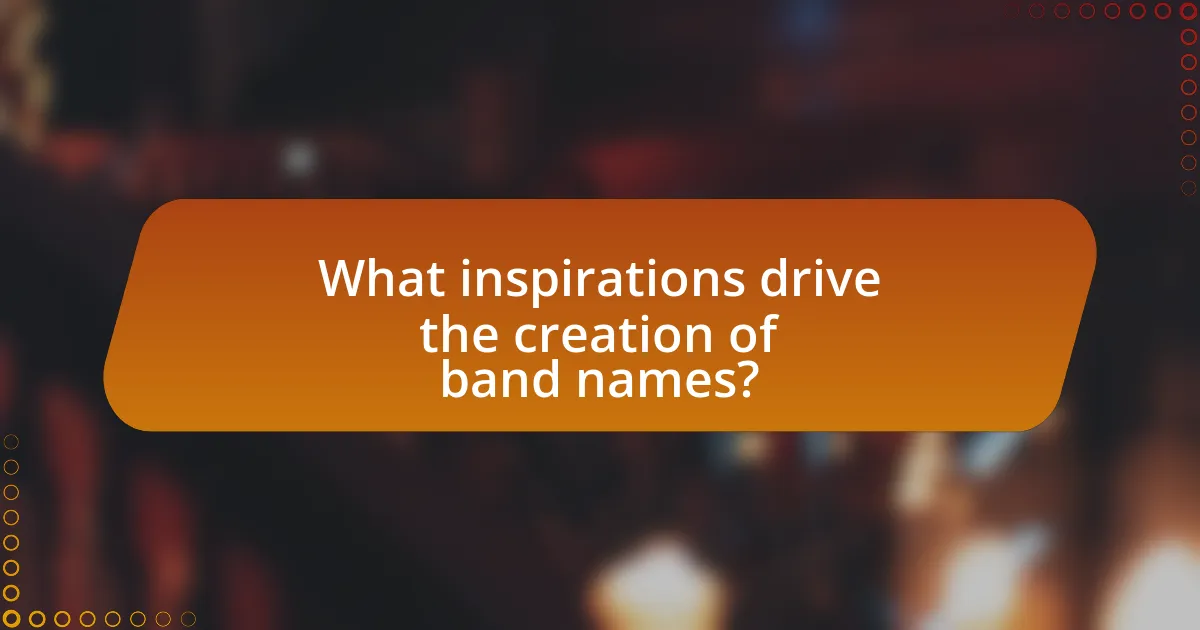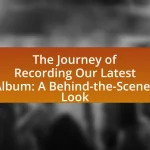The article examines the evolution of band names, highlighting key trends and inspirations that shape their selection. It discusses the impact of unique word combinations, cultural references, and digital culture on naming conventions, as well as how societal changes and genre influence band identities. The article also explores historical shifts in naming trends, the role of personal experiences and relationships, and the significance of literature and art in band name creation. Additionally, it addresses modern trends, including the effects of social media and SEO on band name popularity, while providing best practices for choosing distinctive names in today’s competitive music industry.

What are the key trends in the evolution of band names?
Key trends in the evolution of band names include the use of unique and unconventional word combinations, the incorporation of cultural references, and the influence of digital culture. Bands increasingly favor names that stand out in search engines and social media, leading to the adoption of unusual spellings or entirely new words. For example, the rise of indie and alternative music has seen bands like “Vampire Weekend” and “Tame Impala” use names that evoke specific imagery or cultural touchstones. Additionally, the trend of using acronyms or initials, such as “MGMT” or “LCD Soundsystem,” reflects a shift towards brevity and memorability in a crowded music landscape. These trends are supported by the need for distinctiveness in a digital age where discoverability is crucial for success.
How have cultural movements influenced band naming conventions?
Cultural movements have significantly influenced band naming conventions by reflecting the values, ideologies, and aesthetics of their respective eras. For instance, the punk movement of the 1970s led to the adoption of provocative and anti-establishment names, such as “The Sex Pistols,” which embodied rebellion against societal norms. Similarly, the counterculture of the 1960s inspired bands like “The Grateful Dead,” which resonated with themes of peace and communal living. These names not only served as identifiers but also as statements of purpose, aligning the bands with the cultural sentiments of their time. The influence of cultural movements on band names illustrates how music and societal context are intertwined, shaping public perception and identity within the music industry.
What role does genre play in shaping band names?
Genre significantly influences the creation of band names by reflecting the musical style and cultural identity associated with that genre. For instance, punk bands often adopt aggressive or rebellious names that resonate with the genre’s ethos, such as “The Sex Pistols,” which conveys a sense of defiance. In contrast, names in the pop genre may focus on catchy, memorable phrases that appeal to a broad audience, exemplified by bands like “The Beatles,” which combines simplicity with cultural relevance. This correlation between genre and naming conventions is supported by studies indicating that band names often serve as a branding tool, aligning with the expectations and aesthetics of their respective musical styles.
How do societal changes reflect in band name choices?
Societal changes significantly influence band name choices by reflecting cultural, political, and social movements. For instance, during the 1960s, bands like The Beatles and The Rolling Stones adopted names that resonated with the counterculture and anti-establishment sentiments of the time, showcasing a shift towards individuality and rebellion. Similarly, contemporary bands often choose names that address current social issues, such as systemic inequality or environmental concerns, indicating a direct response to societal challenges. This trend is evident in names like Rage Against the Machine, which explicitly critiques political systems, demonstrating how band names serve as a mirror to the prevailing societal context.
What are some notable historical shifts in band naming trends?
Notable historical shifts in band naming trends include the transition from simple, descriptive names to more abstract and conceptual titles. In the 1950s and 1960s, bands often used straightforward names that reflected their musical style or genre, such as The Beatles or The Beach Boys. However, by the 1970s and 1980s, there was a shift towards more unique and imaginative names, influenced by the rise of punk and alternative music, with bands like The Clash and Talking Heads adopting names that conveyed a sense of attitude or ideology. In the 1990s and 2000s, the trend further evolved with the emergence of eclectic and often nonsensical names, as seen with bands like Radiohead and The Flaming Lips, reflecting a broader cultural shift towards individuality and artistic expression. This evolution illustrates how band names have mirrored societal changes and musical innovations over time.
How did the 1960s counterculture impact band names?
The 1960s counterculture significantly influenced band names by promoting themes of rebellion, experimentation, and social consciousness. Bands adopted names that reflected the era’s ideals, often incorporating psychedelic imagery, political statements, and references to literature or mythology. For example, The Doors, named after Aldous Huxley’s book “The Doors of Perception,” exemplified the era’s fascination with altered states of consciousness. Additionally, bands like Jefferson Airplane and The Grateful Dead used names that evoked a sense of adventure and countercultural ethos, aligning with the movement’s emphasis on freedom and nonconformity. This trend in naming not only captured the spirit of the time but also helped to define the identity of the music associated with the counterculture.
What changes occurred in the 1990s and 2000s regarding band names?
In the 1990s and 2000s, band names increasingly reflected cultural trends, often incorporating elements of irony, humor, and social commentary. This shift was evident as bands like Nirvana and Radiohead emerged, using names that conveyed deeper meanings or challenged conventional norms. Additionally, the rise of the internet and digital culture led to more eclectic and unconventional names, as seen with groups like The Strokes and Death Cab for Cutie, which embraced unique combinations of words to stand out in a crowded music landscape. This period also saw a trend towards shorter, more memorable names, aligning with the growing importance of branding in the music industry.

What inspirations drive the creation of band names?
Inspirations for the creation of band names often stem from personal experiences, cultural references, and artistic influences. Many bands draw from literature, mythology, or historical events, which can provide a rich context and meaning behind their name. For example, the band Led Zeppelin was inspired by a humorous comment made by The Who’s drummer, suggesting that their collaboration would go down like a “lead balloon.” Additionally, some bands choose names that reflect their musical style or ethos, such as Rage Against the Machine, which conveys a message of political resistance. These inspirations not only help to establish a band’s identity but also resonate with audiences, creating a deeper connection through shared cultural or emotional references.
How do personal experiences influence band name selection?
Personal experiences significantly influence band name selection by providing unique narratives and emotional connections that resonate with both the band members and their audience. For instance, many bands choose names that reflect their personal histories, relationships, or pivotal life events, which can create a deeper bond with listeners. A notable example is the band “The Beatles,” whose name was inspired by a combination of personal experiences and a play on words related to the term “beat music,” showcasing how personal context can shape a band’s identity. This connection between personal experiences and band names not only helps in branding but also in establishing a relatable image that can attract a dedicated fan base.
What are some examples of bands naming themselves after personal stories?
Some examples of bands naming themselves after personal stories include The Beatles, which reflects the personal experiences of its members, particularly John Lennon and Paul McCartney’s backgrounds. Another example is The Smiths, named after Morrissey’s family name, which encapsulates his personal narrative and experiences growing up in Manchester. Additionally, the band Nirvana was named by Kurt Cobain, who sought a term that represented his personal quest for peace and enlightenment. These names illustrate how personal stories and experiences can significantly influence band identities and resonate with audiences.
How do relationships and friendships shape band names?
Relationships and friendships significantly influence band names by reflecting the personal connections and shared experiences among band members. These names often emerge from inside jokes, shared interests, or significant moments in the members’ lives, creating a sense of identity and unity. For instance, the band “The Beatles” was named as a play on the term “beat,” which reflects both their musical style and the camaraderie among the members. Additionally, many bands choose names that symbolize their relationships, such as “The Rolling Stones,” which conveys a sense of movement and change, mirroring the dynamics within the group. This connection between personal relationships and band names not only fosters a deeper bond among members but also resonates with fans who relate to the stories behind the names.
What role does literature and art play in band name inspiration?
Literature and art significantly influence band name inspiration by providing thematic depth and cultural references. Many bands draw from literary works, poetry, and visual art to create names that resonate with their musical identity and convey specific emotions or narratives. For instance, the band “The Doors” was inspired by Aldous Huxley’s book “The Doors of Perception,” reflecting a connection to existential themes. Additionally, art movements, such as Surrealism, have inspired names like “The Velvet Underground,” which evokes a sense of avant-garde creativity. This interplay between literature, art, and music enriches the band’s identity and engages audiences through familiar cultural touchstones.
Which famous bands have drawn their names from literary works?
Famous bands that have drawn their names from literary works include The Doors, named after Aldous Huxley’s book “The Doors of Perception,” and The Smiths, which references the common surname used in literature. Additionally, the band Joy Division took its name from the novel “House of Dolls” by Y. E. K. The band Radiohead derived its name from the song “Radio Head” by Talking Heads, which is a literary reference in its own right. These examples illustrate how literary influences shape band identities and contribute to their artistic narratives.
How does visual art influence the naming of bands?
Visual art significantly influences the naming of bands by providing visual themes, concepts, and emotional resonance that can be translated into words. Many bands draw inspiration from famous artworks, artistic movements, or visual aesthetics, which can lead to names that evoke specific imagery or feelings associated with those art forms. For instance, bands like “The Velvet Underground” reference the visual and cultural aesthetics of the 1960s art scene, while “The Black Keys” draws on the visual simplicity and boldness often found in graphic design. This connection between visual art and band names is evident in the way artists often seek to create a cohesive identity that reflects their musical style and artistic vision, thereby enhancing their brand and appeal.

How do modern trends affect band names today?
Modern trends significantly influence band names today by encouraging unique, often unconventional choices that reflect cultural shifts and digital landscapes. For instance, the rise of social media has led to bands adopting names that are catchy, memorable, and easily searchable online, which is crucial for visibility in a crowded market. Additionally, genres like lo-fi, indie, and electronic have popularized names that evoke a sense of nostalgia or abstract concepts, aligning with current aesthetic preferences. This trend is supported by data showing that bands with distinctive names tend to have higher engagement rates on platforms like Spotify and Instagram, indicating that modern naming conventions are closely tied to marketing effectiveness and audience connection.
What impact does social media have on band name popularity?
Social media significantly enhances band name popularity by facilitating rapid exposure and engagement with audiences. Platforms like Instagram, Twitter, and TikTok allow bands to share their music, visuals, and brand narratives directly with fans, leading to increased visibility. For instance, a study by the University of Southern California found that bands with active social media presence experienced a 50% increase in streaming numbers compared to those with minimal online engagement. This direct interaction fosters community building and word-of-mouth promotion, further amplifying the reach of a band’s name.
How do viral trends shape the way bands choose their names?
Viral trends significantly influence how bands select their names by encouraging them to adopt catchy, memorable, and culturally relevant titles that resonate with current audiences. For instance, bands often draw inspiration from popular memes, social media challenges, or trending topics to create names that are easily recognizable and shareable, enhancing their visibility. A notable example is the band “The Chainsmokers,” whose name reflects a trend in lifestyle branding that appeals to younger demographics, aligning with the rise of social media culture. This strategic alignment with viral trends not only aids in marketing but also helps bands connect with listeners on a deeper level, as names that echo contemporary themes tend to attract more attention and engagement.
What are the implications of SEO on band name selection?
SEO significantly influences band name selection by prioritizing names that are unique, memorable, and easily searchable. A distinctive band name enhances online visibility, making it easier for fans to find music on platforms like Google and Spotify. For instance, bands with common names may struggle to rank in search results, leading to potential obscurity. Research indicates that 75% of users never scroll past the first page of search results, emphasizing the need for a name that stands out. Additionally, incorporating relevant keywords can improve search rankings, further impacting the decision-making process for band names.
What are the best practices for choosing a band name in today’s music industry?
The best practices for choosing a band name in today’s music industry include ensuring the name is unique, memorable, and reflective of the band’s identity. A unique name helps avoid legal issues and ensures distinctiveness in search engines and social media platforms. Memorable names facilitate word-of-mouth promotion and audience recall, which is crucial in a crowded market. Additionally, the name should resonate with the band’s genre and style, creating an immediate connection with potential listeners.
Research indicates that bands with names that are easy to pronounce and spell tend to have better visibility and engagement online. For example, a study by the University of Southern California found that bands with simpler names achieved higher streaming numbers on platforms like Spotify. Therefore, focusing on these elements can significantly enhance a band’s chances of success in the competitive music landscape.
How can bands ensure their name stands out in a crowded market?
Bands can ensure their name stands out in a crowded market by choosing unique, memorable names that reflect their musical identity and style. A distinctive name can help create a strong brand presence, making it easier for fans to remember and share. Research indicates that names that evoke imagery or emotions tend to be more memorable; for instance, a study published in the Journal of Marketing Research found that brand names with emotional resonance can enhance consumer recall and preference. Additionally, conducting thorough research to avoid similarities with existing bands can prevent confusion and legal issues, further solidifying a band’s unique identity in the music industry.
What common pitfalls should bands avoid when selecting a name?
Bands should avoid selecting names that are overly complex, difficult to pronounce, or easily confused with existing bands. A name that is hard to spell or remember can hinder audience recognition and marketing efforts. For instance, names like “The Band” or “The Beatles” can lead to confusion due to their generic nature or similarity to well-known entities. Additionally, bands should steer clear of names that may have negative connotations or unintended meanings in different cultures, as this can alienate potential fans. Research indicates that memorable and unique names contribute significantly to a band’s branding and success, as seen in the rise of bands like “Nirvana” and “Radiohead,” which are distinctive and evoke specific imagery.


